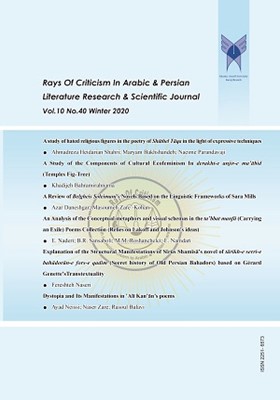The Manifestations of Dystopia and its features in ‛Alī Kan‛ān’s poetry
Subject Areas : Literary criticism
Ayad Neissi
1
![]() ,
Naser Zare
2
*
,
Naser Zare
2
*
![]() ,
Rasoul Balavi
3
,
Rasoul Balavi
3
1 - PHD Student, of Arabic language and literature, Persian Gulf University, Bushehr, Iran
2 - Assistant Professor of Arabic Language and Literature, Persian Gulf University, Bushehr, Iran
3 - Associate Professor of Arabic Language and Literature, Persian Gulf University, Bushehr, Iran
Keywords: ‛Alī Kan‛ān, Dystopia, Contemporary Arabic Poetry, Anarchy and Suffering,
Abstract :
Dystopia, corrupt city, or bitter reality literature is a result of prevailing social and political variables and events. The poet in dystopia depends on the community or the city, and the main factor for the emergence of dystopian elements in the poetic structure. Dystopia manifested itself in the poetic works of ‛Alī Kan‛ān in a remarkable way, and we also reveal the mental and spiritual dimensions of dystopia from various angles, by applying them to examples of ‛Alī Kan‛ān poetic texts, in order to reveal the connotations of this literary phenomenon. This article relies on his study of all kinds of dystopian literature in its poetic lines and then mentions its characteristics and influence in his poetic output, so that we look at the characteristics of this environment in which he lived, and that we arrive accurately at the writer's vision about the corrupt city. Based on this, the research seeks to identify the role of human, social, political, and economic events, which play an important role in obtaining the new meanings of ‛Alī Kan‛ān’s poetic texts and the diversity of their meanings in terms of dystopian literature, with an approach characterized by a descriptive, analytical and the library research method. In this research we concluded that the poet strived in his literary works to give us an honest picture of the corrupt city and its negative impact on society
أَ- الکتب
اصيل، حجت الله. (1381ش). آرمان شهر در انديشه ايرانی. ط 2. طهران: دار نشر ني.
برنيري، ماريا لويزا. (1997م). المدينة الفاضلة عبر التاريخ. ترجمة عطيات أبو السعود. ط 2. الکويت: المجلس الوطني للثقافة والفنون والآداب.
داد، سيما. (1385ش). فرهنگ اصطلاحات ادبی؛ واژهنامه مفاهيم و اصطلاحات ادبی فارسی و اروپائی (تطبيقی و توضيحی). ط 3. طهران: دار نشر مرواريد.
داوري اردکاني، رضا. (1382ش). فارابی فيلسوف فرهنگ. طهران: دار ساقي للنشر.
عايش، قيصر عبد الفتاح. (2003م). معجم الأدباء من العصر الجاهلي حتى سنة 2002م. ج 4. ط 1. بيروت: دار الکتب العلمیة.
کاپلستون، فردريک. (1362ش). تاريخ فلسفه. ترجمة سيدجلال الدين مجتبوي. طهران: مرکز انتشارات علمی فرهنگی.
کنعان، علي. (2010م). الأعمال الشعرية. ط 1. بيروت: المؤسسة العربية للدراسات والنشر.
- Pearsall Judy. (1999). The New Oxford Dictionnary of English. Editor Patrick Hanks. America. Oxford University Press.
-Taylor & Francis. (2000). Routledge Encylopedia of philosophy. Great Britain. Routledge.
ب- المجلات
پرچگاني، فاطمة. (2018م). «الديستوبيا (المدينة الفاسدة) في الرواية العربية المعاصرة؛ قراءة في رواية "أورويل في الضاحية الجنوبية" لفوزي ذبيان». مجلة إضاءات نقدية في الأدبين العربي والفارسي. السنة 8. العدد 29. صص 149-131.
الحسني، أحمد عبدالرزاق ناصر. (2015م). «ثنائية (اليوتوبيا والديستوبيا) في الرواية العراقية دراسة سيميائية». مجلة کلية الآداب جامعة بغداد. العدد 112. صص 210-191
صحرايي، الهام وآخرون. (1394). «فراخوانی شخصیت ایرانی شهرزاد در شعر شاعران معاصر عراق». مجلة مطالعات انتقادی ادبیات. جامعة گلستان. السنة 2. العدد 7. صص 14-1.
گنجيان خناري، علي؛ رضوان جمشيديان. (2014م). «رواية "لعنة الأرض" لجلال آل أحمد في ضوء النقد الاجتماعي». مجلة إضاءات نقدية في الأدبين العربي والفارسي. السنة 4. العدد 16. صص 68-51
_||_

